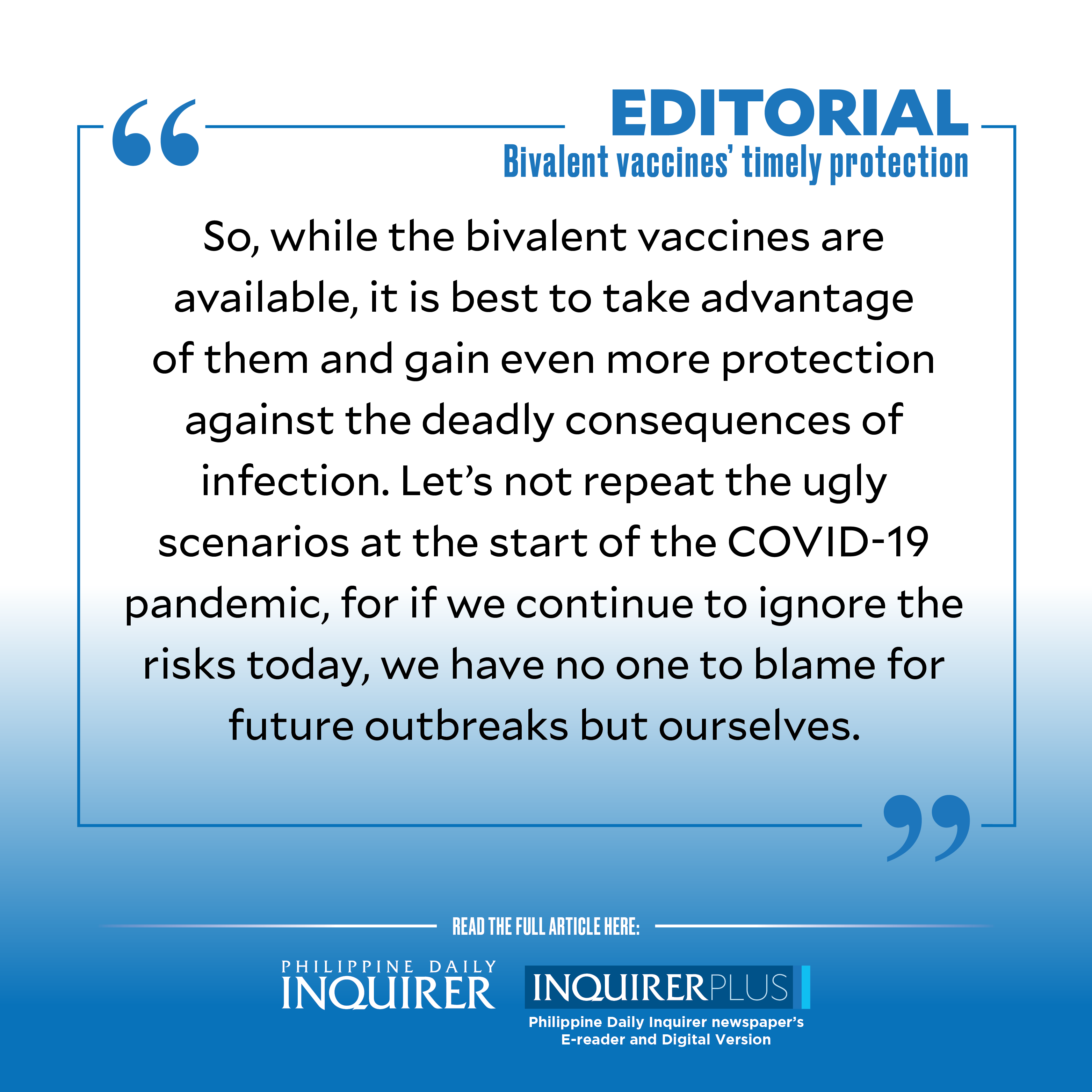Bivalent vaccines’ timely protection

For those living in the Philippines in the early months of the COVID-19 pandemic, the recent news of the arrival of the first batch of bivalent vaccines cannot but be considered fortuitous and a huge relief. Recall that in the early days of the pandemic, even as Filipinos anxiously awaited the arrival of anti-COVID-19 vaccines, health officials seemed to be taking their sweet time placing orders for them. Recall as well that for a time, the only vaccine available to us was Sinovac from China, which rated poorly compared to vaccines made in the United States and Europe. Only after some months were vaccines manufactured by recognized and trusted multinational drug firms like Pfizer and Moderna allowed for use on Filipinos under an emergency use authorization.
These days, though the World Health Organization has lowered the global alert level on COVID-19, it also cautions that it continues as a “global health threat.”
Article continues after this advertisementIn the Philippines, while the number of new COVID-19 cases has been falling, with only 832 infections reported last Feb. 20 to 26, the need for bivalent vaccines, especially for vulnerable groups, remains dire. This is because the COVID-19 virus changes over time, mutating and developing new strains, even as the protection provided by previous vaccine doses wanes after some time. The new vaccines are meant to mitigate the effects of both the “original” virus strain and the “omicron” variant. It, thus, helps protect against severe illness, hospitalization, and death from COVID-19.
Which is why it is still necessary to bring in the bivalent vaccines especially for those among the Department of Health’s (DOH) priority groups: health workers (who were among the first to fall ill and die in the early onset of the pandemic, being in the frontlines of fighting the disease), senior citizens, and those with comorbidities, including immunocompromised cancer patients and those suffering from other serious ailments.
Still, a word of caution is necessary. Some months back in a Senate hearing, former DOH officer in charge Maria Rosario Vergeire admitted that the country’s COVID-19 vaccine wastage may reach 50 million doses by the end of March this year. Those who remember the near-panic felt by Filipinos early in the pandemic could only shake their heads at such waste of resources and funds. Health officials attributed the expiry of unused vaccines to many factors, including logistical challenges such as ensuring the “cold chain” necessary for some vaccines, and distributing the vaccines to remote areas where they are most needed. Another factor may be the Filipinos’ “vaccine hesitancy,” with many still wary of the possible effects of vaccinations, which explains the rapid fall in say, vaccination rates for basic childhood diseases. Poor folk may have been discouraged as well by the loss of their daily wage when they have to line up at health centers for their jabs, the cost of transportation to and from health centers, and the general inconvenience and crowding at the vaccination sites. In reaction, Vergeire assured at the Senate hearing that the DOH was “doing all things possible now so that we can intervene and be able to ramp up the vaccination again.”
Article continues after this advertisementOf fortunate timing then is the appointment of new Health Secretary Teodoro “Ted” Herbosa who, with his new mandate, can hopefully bring a new energy and vision to the vaccination drive. Item number one on his agenda should be to ensure that the fiasco of the vaccine wastage is not repeated, with more efficient distribution and logistical organization, and more effective public education and outreach efforts to those still wary about getting vaccinated.
The same hesitancy remains with the bivalent boosters, even after the coverage was expanded beyond the original priority groups. Indeed, many are showing signs of COVID-19 fatigue, preferring to keep thoughts of the disease at bay and at the back of their minds, ignored and forgotten. But as a people, we do so at our own peril, considering how the family of viruses to which COVID-19 belongs has been evolving constantly and could, in the future, develop into more infectious and deadly strains.
So, while the bivalent vaccines are available, it is best to take advantage of them and gain even more protection against the deadly consequences of infection. Let’s not repeat the ugly scenarios at the start of the COVID-19 pandemic, for if we continue to ignore the risks today, we have no one to blame for future outbreaks but ourselves.
















